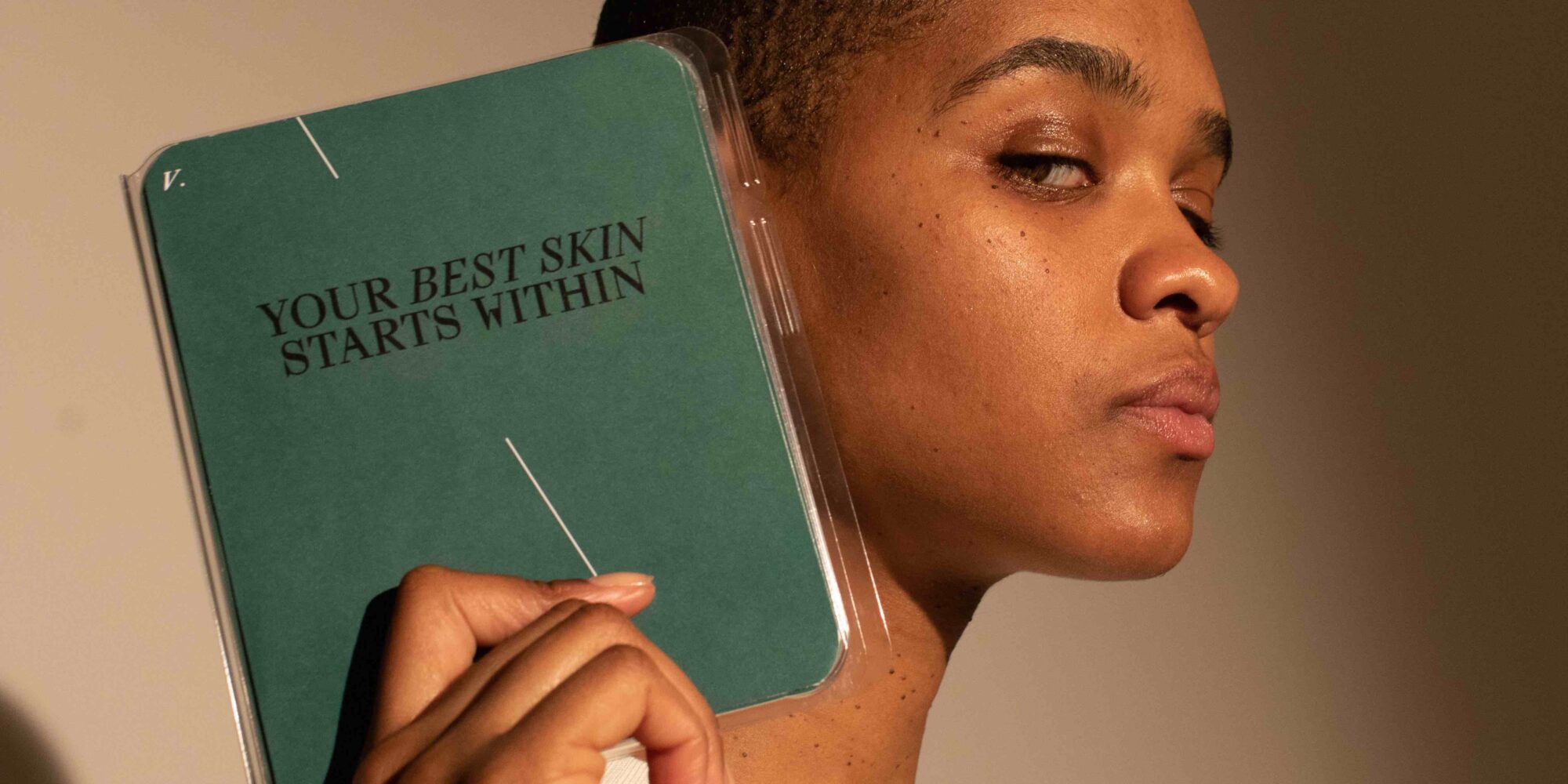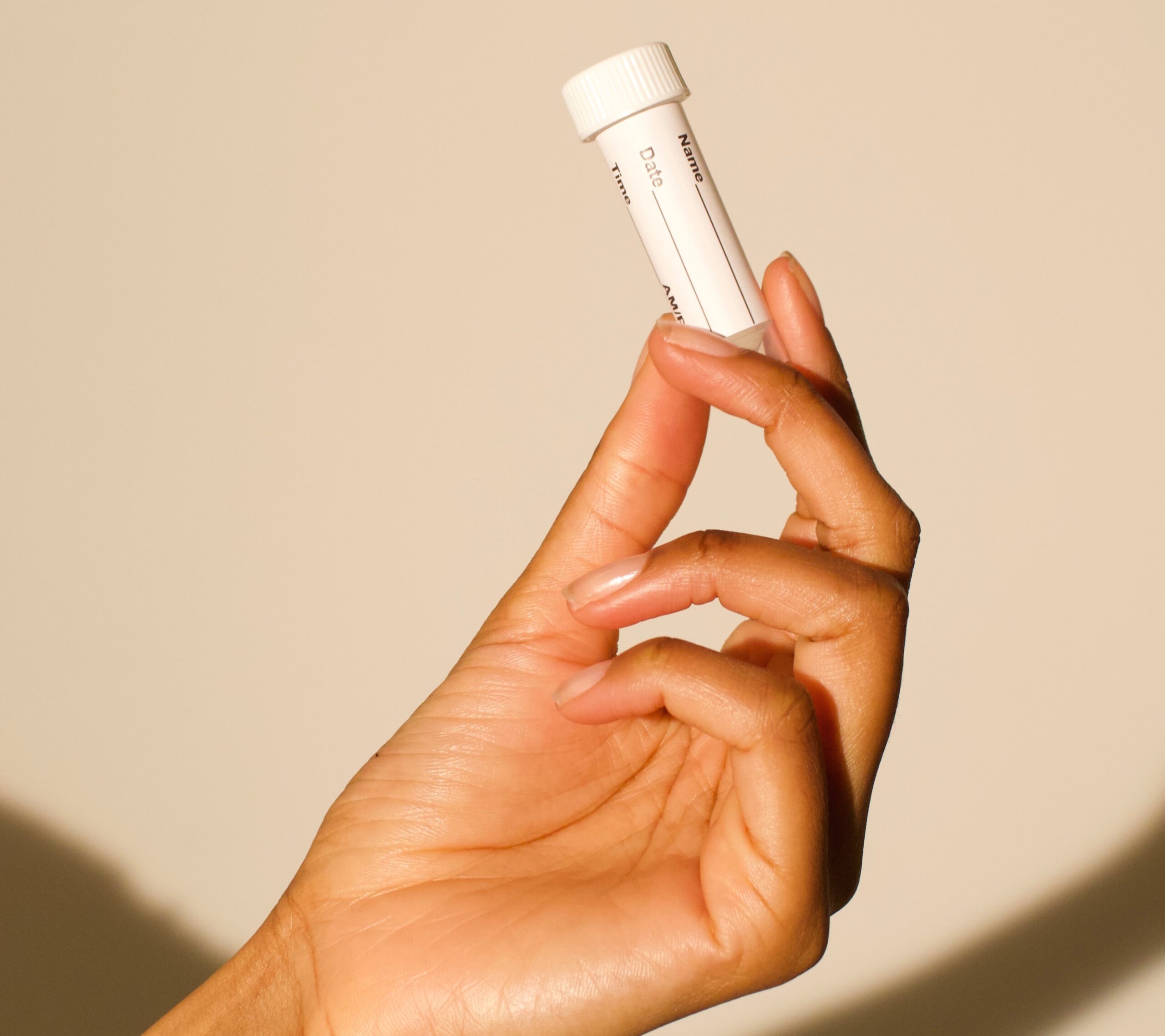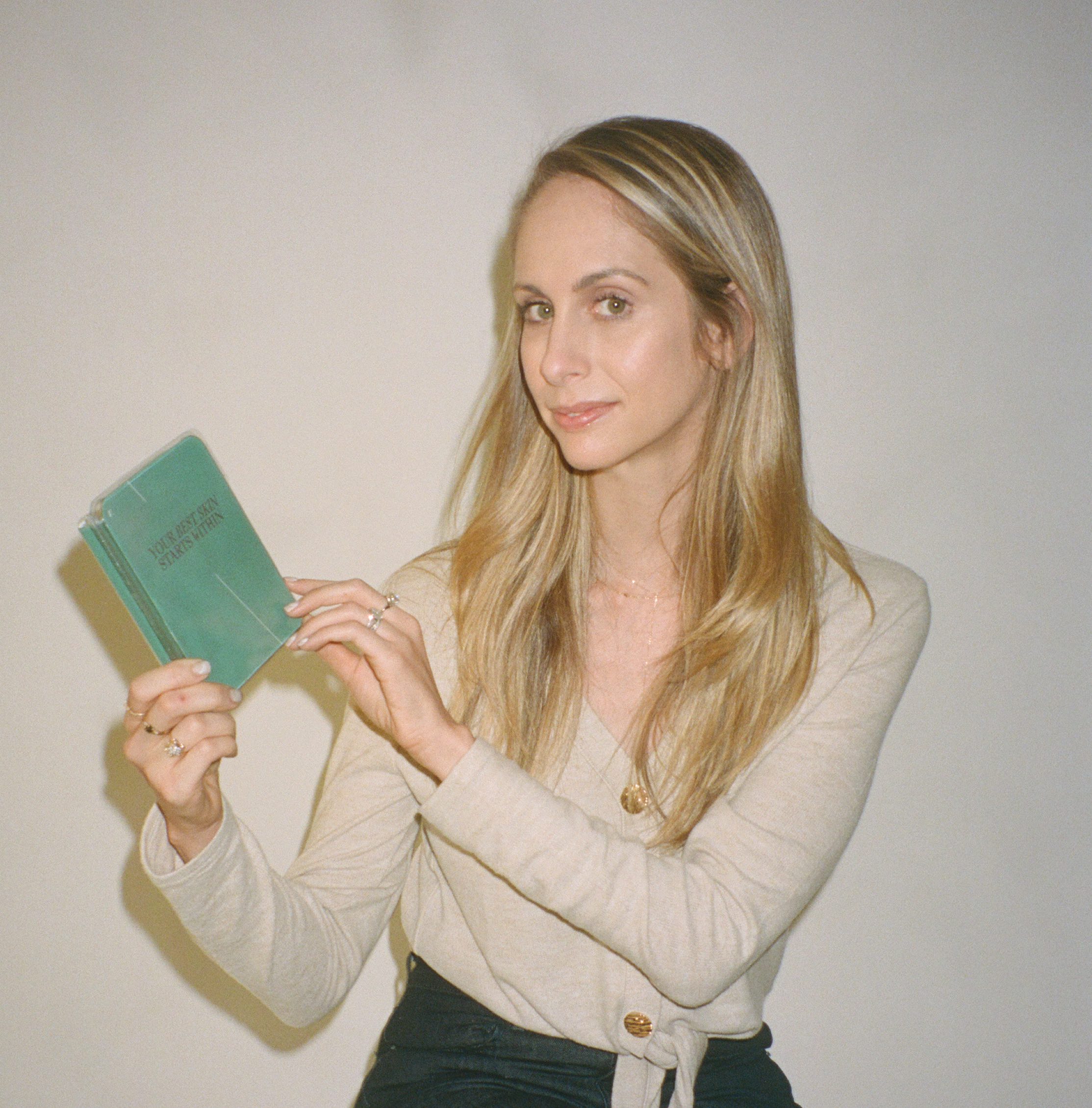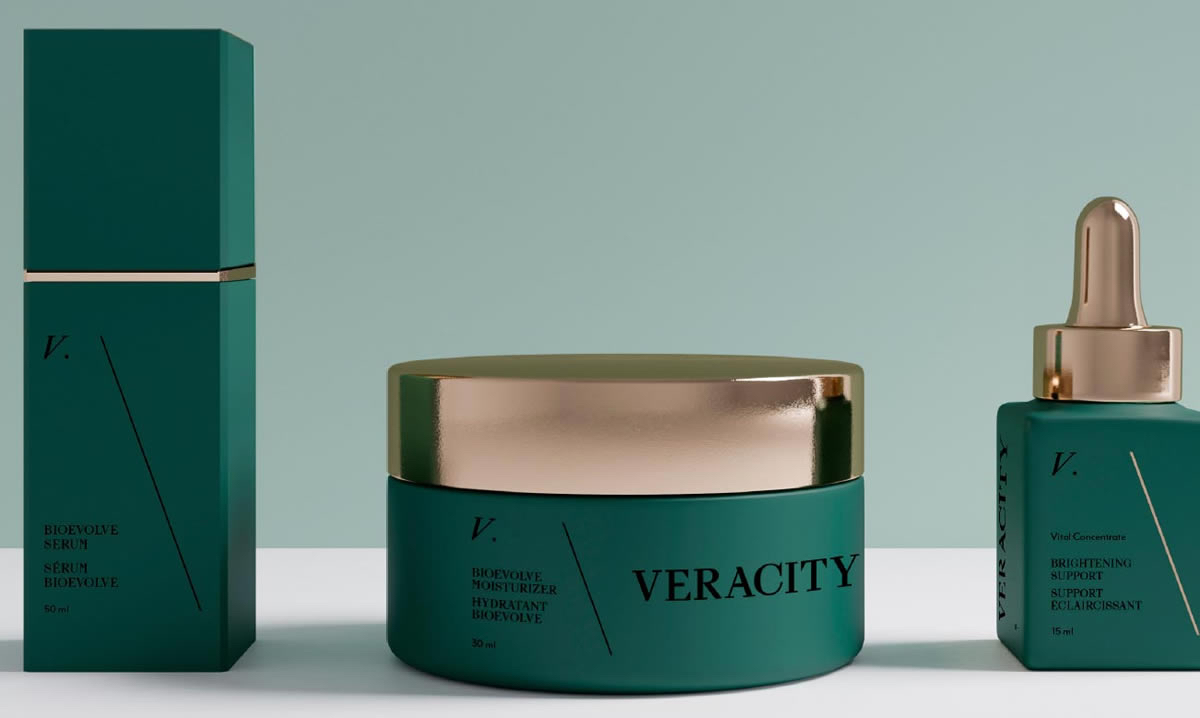
With An At-Home Spit Test, New Brand Veracity Is Helping Consumers Biohack Their Skin Health
While a 29-year-old student at Harvard Business School seven years ago, Allie Egan was afflicted by stubborn dry patches.
“I Googled everything under the sun and went to a dermatologist,” says Egan. “My dermatologist was like, ‘It’s contact dermatitis. Try eliminating what you are using on your skin and adding it back.’ Nothing worked. I was in this perpetual cycle of getting some relief and, then, having it rear its ugly head.”
The mystery of the dry patches was cracked three and a half years later when Egan was confronted with a bigger concern: fertility issues. As she sought medical help to address them, it was uncovered she suffers from Hashimoto’s disease, a condition in which the immune system attacks the thyroid and hormone production is disrupted. As she received treatment for Hashimoto’s and modified her diet, her skin improved, and she gave birth to a son, Cooper, last August.
“My skin was giving me signs not only of what was going on at the surface level, but what was happening with my overall health,” says Egan. “If I had the tools to get the proper care, I would have been able to solve my skin issues earlier and treat my overall health better and wouldn’t have had to go through all the struggles I had to go through on the infertility side, too.”

As she drew the connection between external and internal well-being, Egan, steeped in consumer brands from her time as former CEO of fashion line Cynthia Rowley, associate at private equity firm Catterton, and digital and product marketing specialist at Estée Lauder with stops at La Mer, Clinique and Origins, began pondering a brand that could do the same for people on a broad scale. In 2019, she decided to dedicate herself fully to developing the brand, Veracity, currently in private launch mode with an official debut slated for June.
The centerpiece of the brand is a $149 skin and health test measuring six skin-related biomarkers such as hormones and pH. Similar to 23andMe, Veracity’s test protocol includes tubes users spit into and mail back for analysis. Results are returned in less than two weeks along with health information and recommendations.
“Personalization to us lies in the analysis of you and what’s right for you.”
“We really want to be an educational and eye-opening experience for people to be like, ‘Wow, I didn’t really know what was going on in my body and, now, I have tools in my tool bag to better take control of my skin and other areas of my health,’” says Egan, adding, “We are not going to diagnose. That’s not the intent. We are not trying to create telehealth or replace a doctor, but we will be able to give you insights into elements of your health.”
Veracity purposely steers away from a doom-and-gloom tone. It provides positive tips designed to easily fit into consumers’ lives. For example, Egan mentions a consumer low on antioxidants may be advised to eat salmon twice a week. In consumer trials so far, lifestyle and exercise suggestions are appreciated, and Veracity aims to amplify them. Egan envisions collaborations with authorities in various fields to offer expert advice.

“We don’t make a ton of money off the test. That’s not what I want to do. You look at traditional skincare margins, and we are nowhere near that for our test,” she says. “It’s about the value we are providing through the process, system and community, and it’s about giving resources to our customers so, hopefully, we will be able to earn their trust in a solid way.”
Veracity will drive more margin through beauty products. At the moment, it guides consumers to products from third-party brands featuring ingredients that appear to be beneficial for them based on the outcomes of their skin and health test. In June, the brand will introduce six products. They are BioEvolve Moisturizer, BioEvolve Serum and four supercharged Vital Concentrates serums: Brightening Support for hyperpigmentation and melasma, Inflammation Response for acne and irritation, Regenerating Infusion for cell turnover, and Hydration Balance for dryness, the dilemma Egan is highly familiar with. The products will run from $55 to $85.
“I’ve learned that if you know what you’re battling, whether a minor skin problem or a larger health issue, you can fight the war.”
“Personalization to us lies in the analysis of you and what’s right for you. We have invested a ton of money in our products, and they aren’t just relabeled from base-level contract manufacturer formulas,” says Egan. “We can only do that by focusing on what are the right formulas, and can we clinically prove that they work? To me, that makes a real point of difference to fulfill customer promises of great products and great results.”
Although rigor is important to Egan, she points out the aesthetic she’s chosen for Veracity underscores that it’s a “credible, not clinical experience.” Housed in green and gold packaging, Veracity’s products have an upscale, but straightforward design not loaded up with scientific copy. Skincare shoppers won’t have to take Veracity’s skin and health test to purchase the products. Egan imagines the brand particularly appealing to women undergoing stress that’s impacted their skin or hormonal fluctuations due to pregnancy, the postpartum period or polycystic ovary syndrome (PCOS). Veracity’s formulas are free of potential endocrine disruptors.

“We have designed our system not to be all or nothing. A lot of brands these days they take this very business perspective of, ‘I need to create a basket size of three products and make it subscription-only because that is what investors are telling me makes sense,’ but I know from a consumer perspective—we have talked to hundreds of women—that people sometimes just want a new serum or want results for one particular problem, and that’s how they discover your brand,” says Egan. “I think our Vital Concentrates will be this very different product that we hope you use with our full assortment, but it’s also OK if you want to try that and, hopefully, you will love the product and start to buy more of our assortment. Increase in products per person is something I’m keen on tracking.”
To fund Veracity, Egan has raised a pre-seed round of about $1 million from institutional and angel investors, notably Nancy Twine, founder and CEO of Briogeo, and Meridian Street Capital, an early-stage healthcare investment firm where Egan is an entrepreneur in residence and venture partner. The brand declined to share first-year sales projections.
Content is integral to Veracity’s rollout strategy. Egan explains she’s interested in nurturing an authentic relationship with the brand’s audience prior to pushing product. Veracity’s website premiered in December, and it’s showcasing stories of women on its blog “The Knowledge.” Among those showcased are Justine Liu, president of activewear brand Girlfriend Collective, Jane Hong, CEO of Paintbox, Jolene Hart, founder of Eat Pretty and former beauty editor at InStyle, nutritionist Brianna Towne, runner Tina Muir and Egan. In her post, Egan writes, “I’ve learned that if you know what you’re battling, whether a minor skin problem or a larger health issue, you can fight the war.”





Leave a Reply
You must be logged in to post a comment.